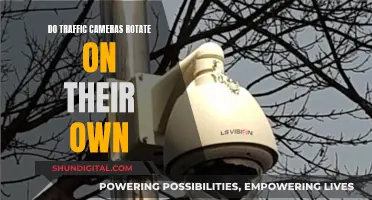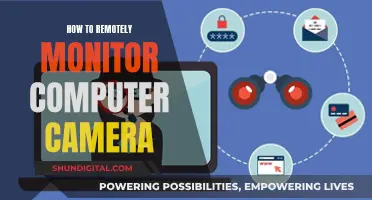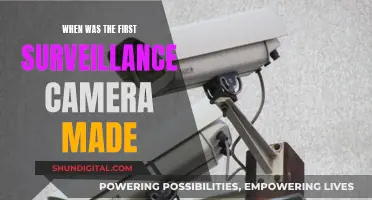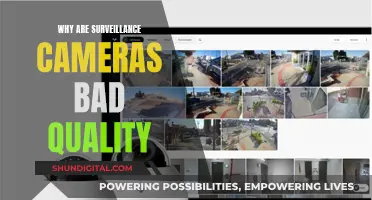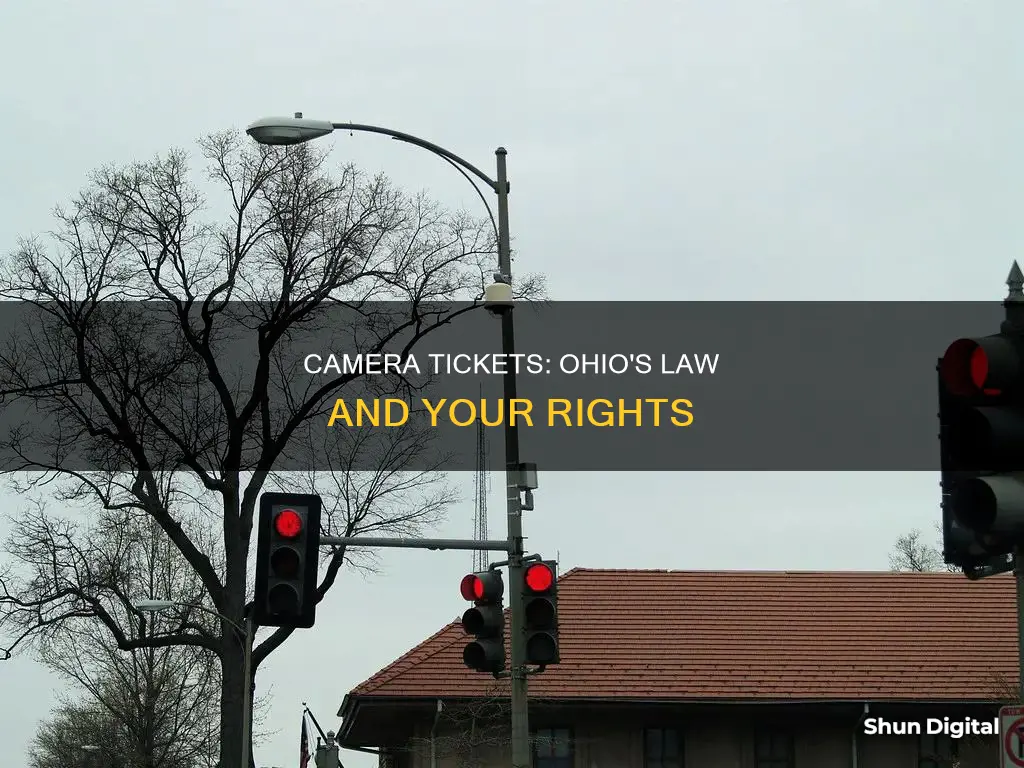
The use of traffic cameras to monitor and enforce traffic laws has been a contentious issue in Ohio for years, with communities and state lawmakers at odds over their legality and effectiveness. While some argue that these cameras improve road safety and free up police resources, others claim that they are merely a revenue-generating tool for local governments. This dispute has resulted in a back-and-forth battle between local and state authorities, with the Ohio Supreme Court being involved on multiple occasions to clarify the rules surrounding their use.
| Characteristics | Values |
|---|---|
| Are camera tickets legal in Ohio? | Yes, with some exceptions. |
| Who can utilize a traffic law photo-monitoring device? | A local authority, including a county or township. |
| Conditions for using a traffic law photo-monitoring device | A law enforcement officer must be present at the location of the device during its operation. |
| Who can issue a ticket for a traffic law violation detected by a photo-monitoring device? | A law enforcement officer who is present at the location of the device and who personally witnesses the violation. |
| What happens if the officer does not issue a ticket? | The local authority may issue a ticket in accordance with the Revised Code. |
| Who cannot utilize a traffic law photo-monitoring device? | A township constable, member of a township police force, or other representative of a township on an interstate highway. |
| Are there any bills to restrict the use of traffic cameras? | Yes, Rep. Tom Patton of Strongsville has introduced seven bills in the Ohio House to restrict and regulate the use of traffic cameras. |
What You'll Learn

A police officer must be present at the camera location
In Ohio, a police officer must be present at the location of a traffic law photo-monitoring device for a traffic camera ticket to be valid. This is outlined in the Ohio Revised Code, which states that a local authority can only use a traffic law photo-monitoring device to detect and enforce traffic law violations if a law enforcement officer is present at the location of the device during its operation.
The presence of a police officer at the camera location is a crucial stipulation for the legality of traffic camera tickets. This requirement was reinstated by the Ohio legislature, which also passed a law in 2004 allowing cities to install red-light and speed cameras to issue tickets for traffic violations. While the use of traffic cameras is permitted under state law, individual city ordinances and court rulings also play a role in their legality.
The Ohio Supreme Court is currently considering several cases related to the use of traffic cameras, including concerns about due process and the distribution of revenue generated from camera-issued tickets. The court's rulings will have a significant impact on the future use of traffic cameras in the state.
It's important to note that traffic camera tickets in Ohio are enforceable and can result in consequences such as driver's license suspension if left unpaid or ignored. However, these tickets are typically treated as civil violations rather than criminal offences, and they do not appear on driving records or affect insurance rates like traditional speeding tickets.
Echomaster Camera: Where Are These Devices Manufactured?
You may want to see also

The legality of camera tickets is a local-versus-state control issue
The legality of camera tickets in Ohio is a complex issue, with ongoing debates and court battles between local communities and the state government. While camera tickets are legal in Ohio, there are specific conditions that must be met for them to be enforceable. This has led to a back-and-forth battle between local municipalities and the state over the rules surrounding these camera-based ticketing systems.
Ohio Revised Code Section 4511.093 outlines the conditions under which traffic law photo-monitoring devices can be used by local authorities to detect and enforce traffic law violations. One key requirement is the presence of a law enforcement officer at the location of the device during its operation. This condition aims to ensure that tickets are issued correctly and provide a level of accountability.
The use of traffic cameras has raised concerns among citizens and lawmakers alike. Some argue that these cameras are an effective tool for local authorities to curb reckless driving and improve public safety. On the other hand, critics claim that they are merely a way for municipalities to generate revenue without imposing additional taxes on residents. The debate centres around the question of local versus state control, with local communities advocating for the use of cameras and the state attempting to restrict and regulate their deployment.
The Ohio Supreme Court has been actively involved in this matter, hearing arguments and considering rulings on multiple cases related to traffic camera tickets. One of the key issues before the court is the disposition of funds generated from automated speeding tickets. House Bill 62, part of the state's transportation budget, mandates that state funding to local governments be reduced by the amount of fines collected through traffic cameras. This has led to pushback from local communities, with cities like Newburgh Heights and East Cleveland challenging this provision in court.
In addition to the legal battles, lawmakers have also proposed legislation to address the issue. Representative Tom Patton of Strongsville has introduced seven bills in the Ohio House aimed at restricting and regulating the use of traffic cameras. These bills propose various measures, including prohibiting the use of cameras by certain local authorities, limiting the number of tickets that can be issued, and mandating that a significant portion of the revenue from camera tickets be allocated to law enforcement expenses.
The ongoing debate and legal battles highlight the complex nature of the issue, with valid arguments and concerns on both sides. As the discussion continues, it remains to be seen how the legality of camera tickets in Ohio will ultimately be resolved, and whether a balance can be struck between local control and state regulation.
Foscam Camera Production Origins: Where Are They Made?
You may want to see also

Camera tickets are civil penalties
Camera tickets, otherwise known as civil penalties, are legal in Ohio. They are considered civil violations that result in financial penalties. While they don't go on your driving record, failure to respond to a camera ticket or appear in court can lead to a driver's license suspension. This means that you can't renew your license or register a new vehicle until you've paid the fines and other associated fees.
Camera tickets are often treated differently from traditional speeding tickets. They are usually issued by a local authority using a traffic law photo-monitoring device, with certain stipulations. Firstly, a law enforcement officer must be present at the location of the device during its operation. Secondly, the local authority must comply with specific sections of the Revised Code. If these conditions are met and a traffic violation is recorded, the officer present may issue a ticket.
The legality of camera tickets in Ohio is based on state law, individual city ordinances, and court rulings. While some cities have chosen to remove traffic cameras, others continue to use them. Camera tickets have faced legal challenges, including citing the violation without identifying the driver, violating equal protection and due process clauses, and contradicting city traffic codes.
It is important to note that ignoring a camera ticket may result in increased fines and a negative impact on your driving record. Disputing the ticket in court is an option, and you may be able to avoid the ticket if it was not issued correctly.
Quick-Charging Camera Batteries: Efficient Methods to Try
You may want to see also

Camera tickets don't go on driving records
The use of camera tickets is a contentious issue in Ohio, with questions arising around due process, public safety, and revenue. While the state and local municipalities battle over the rules surrounding speed cameras, it is important to understand the implications for drivers. One key aspect to note is that camera tickets do not go on driving records.
In Ohio, speed cameras are operated by private companies, and the tickets issued are considered civil penalties. These camera tickets are treated as non-moving violations, similar to parking tickets or tickets for expired registration. They do not carry the same weight as a traditional ticket issued by a law enforcement officer. The main difference is that a camera ticket will not result in any points being added to your driver's license or any marks on your driving record. This is a significant distinction because, in the state of Ohio, having points on your license or infractions on your record can lead to increased car insurance rates.
The absence of camera tickets from driving records means that insurance companies will not have access to this information when assessing a driver's risk profile. As a result, your insurance rates will not be directly impacted by a camera-issued speeding or red-light ticket. This is in stark contrast to traditional tickets, which can lead to increased insurance premiums, depending on the severity of the violation.
It is worth noting that while camera tickets may not go on your driving record, they can still have financial implications. As civil penalties, these tickets can be collected through bill collectors, which could potentially affect your credit rating if left unpaid. Additionally, if you are a habitual offender, your driving record may reflect multiple offenses, which could then impact your insurance rates.
The legality of camera tickets in Ohio is a complex and evolving issue, with ongoing debates in the state Supreme Court and the introduction of bills aiming to restrict and regulate their use. However, for now, it is important for drivers to understand their rights and responsibilities when it comes to these automated enforcement citations. By being aware of the potential consequences, drivers can make informed decisions and take appropriate actions, such as paying fines and driving more cautiously to avoid future infractions.
Charging Your Lumix Waterproof Camera: A Step-by-Step Guide
You may want to see also

Ohio cities to lose traffic camera revenue as law takes effect
A law that erases cities' profits from operating traffic cameras has taken effect in Ohio. The new law, which was signed by Republican Gov. Mike DeWine, reduces state funding for any city, town, or village operating red light or speed cameras by an amount equivalent to the fines collected. This means that cities will no longer be able to profit from the use of traffic cameras, and may even lose money if the fines collected are greater than the cost of operating the cameras.
The law also prohibits the operation of traffic cameras on interstate highways and requires that all appeals of tickets received through camera technology be heard in court rather than by an administrative officer. These restrictions are intended to protect Ohioans from overzealous officials who may be "trying to make a quick buck" according to Republican Rep. Niraj Antani.
The battle over traffic cameras in Ohio has been ongoing for several years, with communities in Northeast Ohio at the center of the debate. While some argue that fixed cameras and hand-held devices used by officers help cut down on reckless driving, others assert that the technology is simply a way for municipalities to bring in more revenue without taxing residents. The Ohio Supreme Court is currently considering several cases related to the use of traffic cameras, including whether cities should be allowed to keep the extra revenue generated by the cameras.
In addition to the new law, a series of bills have been introduced in the Ohio House by Rep. Tom Patton of Strongsville that aim to further restrict and regulate the use of traffic enforcement cameras across the state. These bills include prohibiting the use of traffic cameras by certain types of municipalities, limiting the number of tickets that can be issued based on camera evidence, and requiring a certain percentage of revenue from camera tickets to be used for law enforcement expenses.
The impact of the new law and potential additional restrictions remains to be seen, but it is clear that Ohio cities will no longer be able to rely on traffic camera revenue as a source of income.
Charging Rechargeable Camera Batteries: A Step-by-Step Guide
You may want to see also
Frequently asked questions
Yes, camera tickets are legal in Ohio. However, there are certain conditions that must be met. For example, a law enforcement officer must be present at the location of the camera during its operation.
There is an ongoing debate between communities that want to use traffic cameras as a safety tool and state lawmakers who see them as a money grab. Some lawmakers have introduced bills to restrict and regulate the use of traffic cameras in the state.
They believe that cameras keep intersections safe by deterring people from speeding or running red lights. They also free up police resources and the fines act as a deterrent.
One big concern is a driver's ability to challenge the ticket and ensure it was issued correctly. Speed cameras are often run by private companies, and the streamlined administrative hearings may limit citizens' ability to dispute the ticket.
The Ohio Supreme Court has heard several cases related to the use of traffic cameras and the distribution of fines collected from camera tickets. The specific laws and requirements regarding camera tickets have also been subject to legal challenges and continue to evolve.


